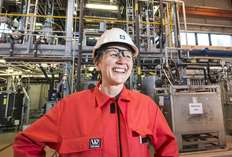- The SecREEts project received EUR 12.5 million from the EU Horizon 2020 program.
- Yara's phosphate rock contains 0.3-1.0% rare earth elements like cerium, thulium, and lutetium.
- REEtec will build a demo facility next to Yara's plant, operational by 2018.
- SINTEF manages the project, aiming to reduce Europe's reliance on Chinese rare earth imports.

Project Overview
The SecREEts project, a collaboration between Yara, REEtec, and SINTEF, has secured EUR 12.5 million from the EU Horizon 2020 program. The initiative aims to establish a sustainable and secure method for extracting and processing rare earth elements in Europe.
Resource Utilization
Yara's phosphate rock, used in fertilizer production, contains rare earth elements such as cerium, thulium, and lutetium. These elements, currently ending up in fertilizers, will be extracted during the production process at Yara Porsgrunn. REEtec has developed a new technology for separating these elements and plans to build a demo facility adjacent to Yara's plant.
European Supply Chain
Europe relies heavily on imports of rare earth elements, predominantly from China. The project aims to create a European supply chain for these critical materials, reducing dependency on Chinese imports. REEtec's new separation technology will be implemented in an industrial-scale demonstration plant, expected to be operational by 2018.
Horizon 2020 Support
Horizon 2020, the world's largest research and innovation program, has allocated about EUR 80 billion for the 2014-2020 period. The application process for these grants is highly competitive, with only four out of 49 participants succeeding in this round. SINTEF will oversee the project, enhancing its expertise in rare earth element extraction while supporting Yara and REEtec in developing efficient processes and routines.

